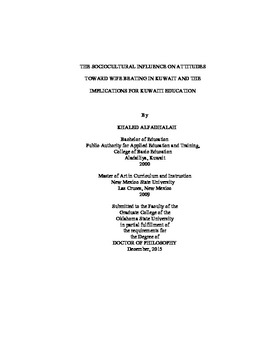| dc.contributor.advisor | Zhao, Guoping | |
| dc.contributor.author | Alfadhalah, Khaled | |
| dc.date.accessioned | 2016-09-29T18:43:57Z | |
| dc.date.available | 2016-09-29T18:43:57Z | |
| dc.date.issued | 2015-12 | |
| dc.identifier.uri | https://hdl.handle.net/11244/45337 | |
| dc.description.abstract | This study investigated the influence of several predictor variables on attitudes toward wife beating among Kuwaiti college students (N=208). The hypothesized predictors of attitudes toward wife beating were (1) attitudes toward gender roles, (2) intrinsic religiosity, (3) extrinsic religiosity, (4) experiencing physical violence in childhood, and (5) witnessing physical violence between parents in childhood. Specifically, it was hypothesized that there would be a significant difference between male and female participants' attitudes toward wife beating. In addition, it was hypothesized that there would be a significant negative relationship between egalitarian attitudes toward gender roles and supportive attitudes toward wife beating. Moreover, it was hypothesized that there would be a significant positive relationship between intrinsic religiosity, extrinsic religiosity, experiencing physical violence in childhood, and witnessing physical violence between parents in childhood and supportive attitudes toward wife beating. It was also hypothesized that combinations of the five predictor variables would explain a significant portion of the variance in attitudes toward wife beating. | |
| dc.description.abstract | The sample consisted of 208 male and female students, recruited from The College of Basic Education in Kuwait. Participants completed the Inventory of Beliefs about Wife Beating (IBWB) scale, the Sex-Role Egalitarianism Scale (SRES), the intrinsic and extrinsic subscales of the Islamic Behavioral Religiosity (IBR) scale, the physical abusiveness subscale of the Exposure to Abusive and Supportive Environments Parenting Inventory (EASE-PI), the physical assault subscale of the adult-recall version of the revised Conflicts Tactics Scales (CTS2), and a demographic questionnaire. The data were analyzed using independent samples t-test, Pearson correlation coefficient r, and multiple regression analysis. | |
| dc.description.abstract | The study found that male participants were significantly more likely to support wife beating than female participants. In addition, there was a significant support for all the hypothesized relationships between predictor variables and attitudes toward wife beating. Moreover, a combination of predictor variables in this study significantly explained 43.1% of the total variance in attitudes toward wife beating. Based on the findings of this study, implications for education in Kuwait and recommendations for future research are discussed. | |
| dc.format | application/pdf | |
| dc.language | en_US | |
| dc.rights | Copyright is held by the author who has granted the Oklahoma State University Library the non-exclusive right to share this material in its institutional repository. Contact Digital Library Services at lib-dls@okstate.edu or 405-744-9161 for the permission policy on the use, reproduction or distribution of this material. | |
| dc.title | Sociocultural influence on attitudes toward wife beating in Kuwait and the implications for Kuwaiti education | |
| dc.contributor.committeeMember | Bailey, Lucy | |
| dc.contributor.committeeMember | Foubert, John | |
| dc.contributor.committeeMember | Wang, Qiuying | |
| osu.filename | Alfadhalah_okstate_0664D_14277.pdf | |
| osu.accesstype | Open Access | |
| dc.type.genre | Dissertation | |
| dc.type.material | Text | |
| thesis.degree.discipline | Education | |
| thesis.degree.grantor | Oklahoma State University | |
